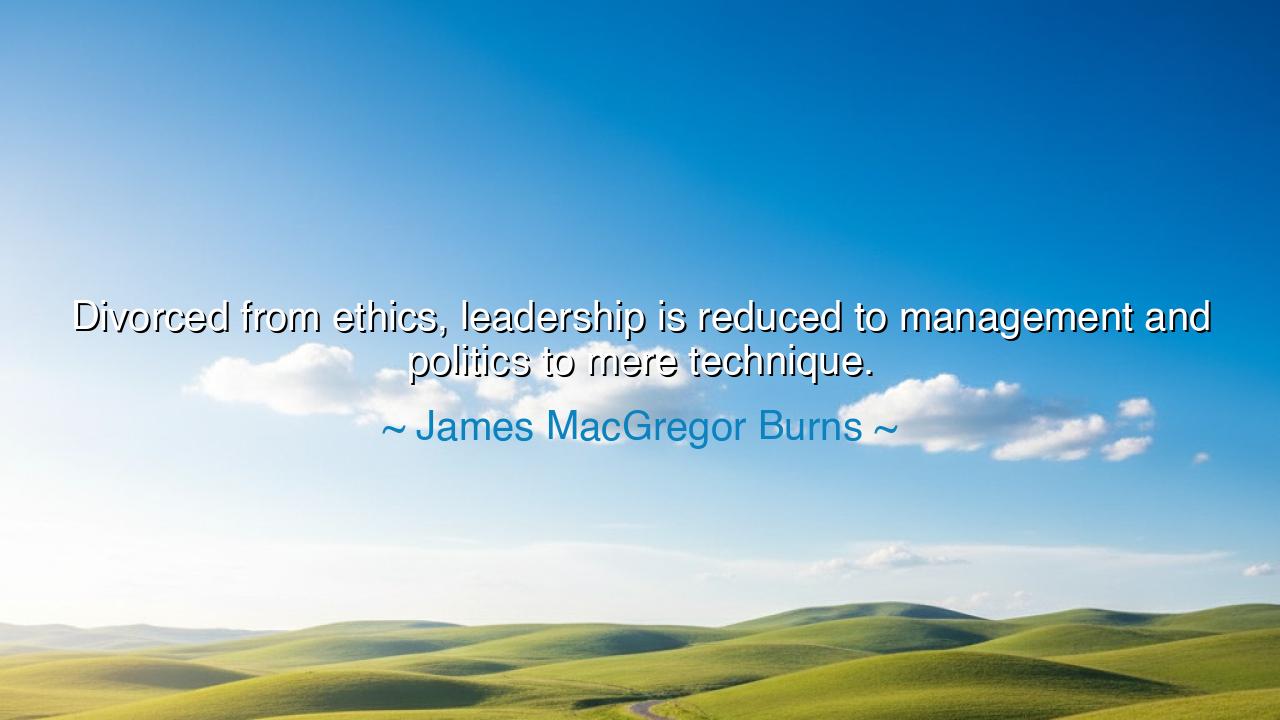
Divorced from ethics, leadership is reduced to management and
Divorced from ethics, leadership is reduced to management and politics to mere technique.






“Divorced from ethics, leadership is reduced to management and politics to mere technique.” — James MacGregor Burns
There are words that echo like thunder through the corridors of time, and among them are these — spoken by James MacGregor Burns, the great scholar of leadership. His warning is timeless: that when leadership is stripped of ethics, when power forgets its purpose, when ambition loses sight of virtue, then what remains is but a hollow shell — a machine that moves without meaning. For leadership without ethics is like a ship without a compass: it may travel far, but it knows not where it goes, nor whom it may destroy in its passage.
In the age of kings and empires, the ancients often spoke of the sacred bond between power and morality. Plato himself declared that rulers must be philosopher-kings — those who love wisdom more than wealth, and justice more than victory. Burns, speaking centuries later, rekindled that ancient truth for the modern world. He saw that leadership had become a profession, politics a science, and power a game. Yet without the guiding star of ethics, these crafts no longer served humanity; they served themselves. Leadership became management — efficient but empty. Politics became technique — clever but corrupt. The soul was gone, and only the structure remained.
Look, then, to the story of Marcus Aurelius, the Roman emperor who ruled both armies and his own heart. Though he commanded legions, he understood that leadership’s first conquest must be the self. In his Meditations, he wrote of duty, compassion, and the moral weight of power. He governed not through fear, but through virtue — knowing that the greatness of an empire begins with the goodness of its leader. Contrast this with the tyrants who came after him, whose brilliance in administration could not hide the rot within. They mastered management and technique, but they had no soul — and so Rome, magnificent in form, crumbled in spirit.
Burns’ words, though modern, carry that same lesson. He saw leaders rising who could organize armies, draft policies, and move nations — yet who lacked the moral vision to guide them toward justice. A leader, he said, must not only direct but transform. For leadership is not merely the exercise of power, but the elevation of purpose. Without ethics, it becomes manipulation. Without moral courage, it becomes control. The true leader does not merely solve problems — they shape meaning, inspiring others not just to act, but to become more than they were.
Think also of the 20th century, when Winston Churchill stood before the darkness of tyranny. His words rallied a nation not because he was skilled in rhetoric alone, but because his leadership was rooted in moral conviction. He spoke not for conquest, but for freedom. He was not managing a crisis — he was guiding a civilization’s soul. Meanwhile, his adversary across the sea, Adolf Hitler, wielded tremendous skill, organization, and persuasion — yet his power, divorced from ethics, led to the most profound ruin the world had ever seen. The contrast is clear: one led with conscience, the other with cunning. One saved humanity; the other nearly destroyed it.
The ancients would have said that ethics is to leadership what breath is to life. You can move without it, but you cannot truly live. When a society forgets this truth, it becomes efficient in the wrong direction — fast, clever, and utterly lost. A leader who pursues success without morality may win battles, but they will lose generations. For the fruits of unethical power are always bitter, even when they glitter at first.
So take this wisdom into your own heart, you who would lead, teach, or serve. Let your ethics be your anchor, your conscience your compass. Do not seek to be effective before you are right, nor powerful before you are just. Ask not only “What can I do?” but “What should I do?” For the former builds empires that crumble; the latter builds legacies that endure.
And remember this: leadership and ethics are twins born of the same soul. To separate them is to destroy them both. When you lead with virtue, even small actions become noble. When you act without it, even grand achievements turn to dust. Thus, as Burns reminds us, greatness is not measured by control, but by character; not by technique, but by truth. Lead, then, with a moral heart — and your leadership will outlive the shadows of your time.






AAdministratorAdministrator
Welcome, honored guests. Please leave a comment, we will respond soon